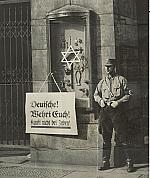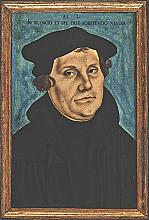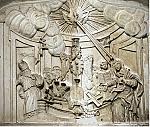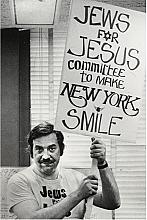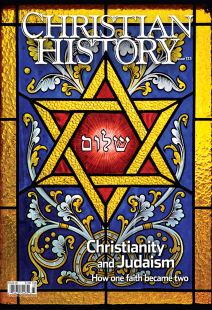Christian History Timeline: Christianity & Judaism
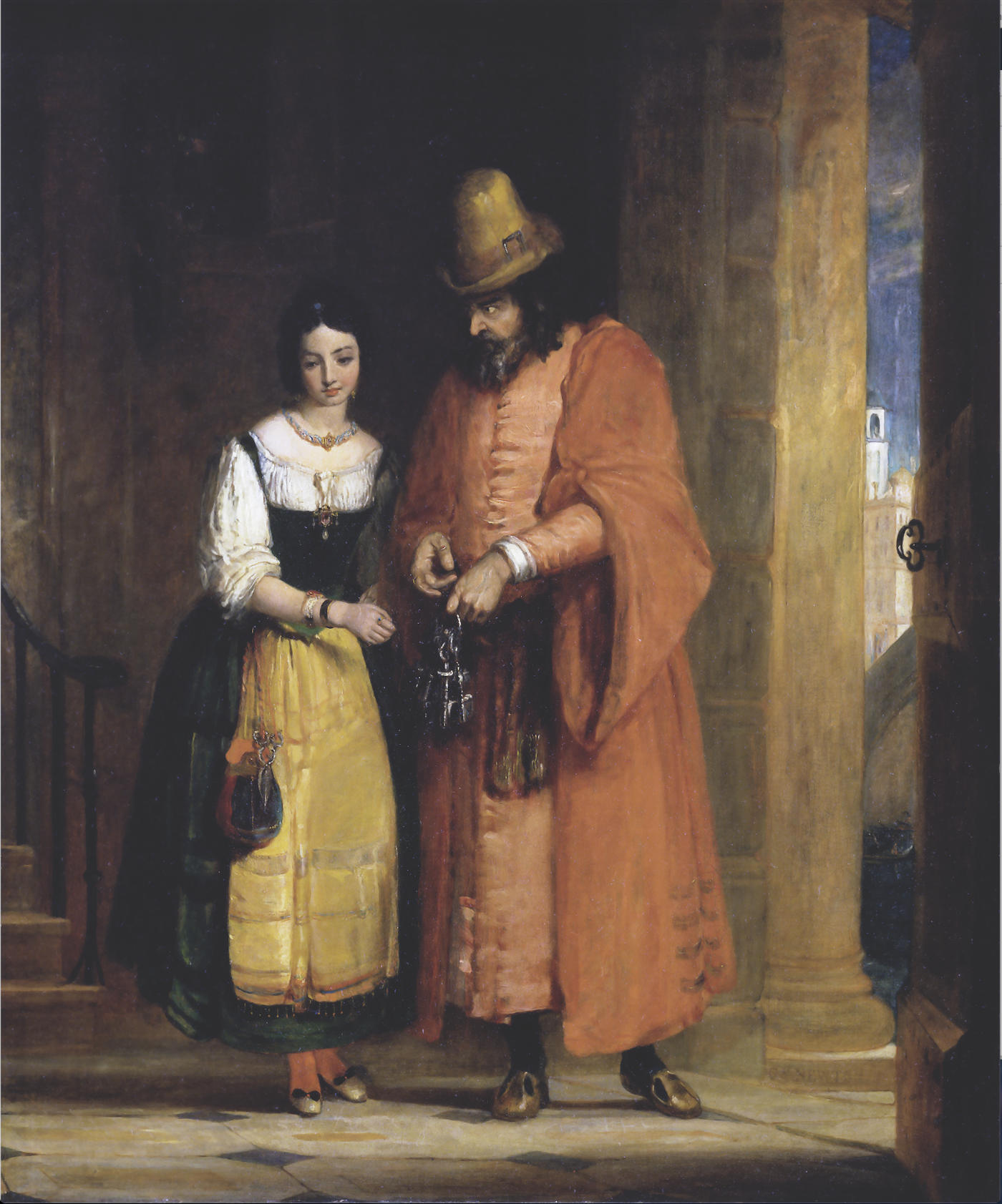
[Gilbert Stuart Newton, Shylock and Jessica (1830)—Wilimedia]
The history of Jewish-Christian relations is complex and has both political and theological aspects. Here are a few of the major people and events featured in this issue to help guide you through the story.
— c. 50 Jerusalem Council (Acts 15) says gentile converts to Christianity do not need to observe the Mosaic law.
— 70 Romans destroy Second Temple in Jerusalem.
— c. 100 Gamaliel II, leader of the Sanhedrin, excludes Christians and other “sectarians” from synagogues.
— 132–133 Bar Kochba rebellion leads Roman Empire to bar Jews from Jerusalem.
— c. 200 Mishnah is compiled.
— c. 305 A council in Spain forbids Christians and Jews to intermarry or share meals.
— 313 Christianity is legalized in the Roman Empire.
— 315 Constantine forbids Jews from making converts.
— 325 Council of Nicaea separates the date of Easter from the Jewish calendar.
— c. 350 Jerusalem Talmud is compiled.
— 380 Christianity becomes official religion of Roman Empire.
— c. 386 John Chrysostom preaches Adversus Judaeos, “Against the Jews.”
— 388 All marriage between Jews and Christians in the Roman Empire is forbidden.
— c. 398 Augustine articulates the “witness” doctrine, which will govern church dealings with the Jews for centuries.
— 439 Jews are forbidden to hold certain offices in the Roman Empire and to build new synagogues.
— c . 500 Babylonian Talmud is compiled.
— 531 Jews are forbidden to bear witness against Christians in court.
— 591 Pope Gregory I condemns forced baptism of Jews.
— c. 600 Edictum Theodorici loosens some restrictions on Germanic Jews.
— 602 Pope Gregory I protects Jews celebrating their religious festivals.
— 693–694 Councils of Toledo restrict Jewish life in Spain.
— 794 Charlemagne encourages Jewish moneylending, then later restricts it in the Capitulary for the Jews (814).
— 1099 The First Crusade establishes the Kingdom of Jerusalem. Crusaders massacre many Jews along the way.
— 1144 Jews in Norwich are falsely accused of murder in the first known instance of “blood libel” (the accusation that Jews require Christian blood for their rituals).
— 1187 Muslim leader Saladin defeats Christian troops and captures Jerusalem.
— 1190 Maimonides writes Guide for the Perplexed.
— 1192 Kingdom of Jerusalem establishes a new capital at Acre.
— 1211 Three hundred French and English rabbis migrate to the Holy Land.
— 1215 Fourth Lateran Council requires Jews and Muslims to wear distinctive dress to prevent intermarriage.
— 1243 First known accusation against Jews of desecrating the Christian host (Communion wafer).
— 1247 Pope Innocent IV issues a mandate against blood libels.
— 1278 Pope Nicholas III requires Jews to attend conversion sermons.
— 1290 Jews are expelled from England.
— 1291 Acre falls to Muslim troops.
— c. 1300 Christian writer Ramon Llull becomes interested in Kabbalah.
— 1320 Baruch appears in court to protest his false conversion.
— 1478 The Spanish Inquisition begins.
— 1489 Christian kabbalistic philosopher Pico della Mirandola publishes Heptaplus.
— 1492 Alhambra Decree orders Jews to convert or leave Spain.
— 1516 Jews in Venice are segregated into a ghetto; other cities adopt this practice later.
— 1543 Martin Luther publishes About the Jews and Their Lies.
— 1553 Roman Inquisition burns a copy of the Talmud in Rome.
— 1621 English lawyer Henry Finch publishes The World’s Great Restauration, which proposes a temporal Jewish homeland.
— 1645 Memoirist Glückel of Hameln is born.
— 1649 Johanna and Ebenezer Cartwright petition Oliver Cromwell, recommending a return of the Jews to Israel.
— 1655 Cromwell readmits Jews to England.
— 1730 Jews of Rhode Island build first North American synagogue.
— 1770–1880 Haskalah, Jewish Enlightenment, occurs in Central and Eastern Europe.
— 1858 Lionel de Rothschild becomes first Jewish member of the British Parliament.
— 1882 The word pogrom receives its first known use to describe a massacre of Jews in Russia
— 1891 American businessman William Blackstone spearheads a petition to return Jews to the Holy Land.
— 1897 Theodore Herzl formally establishes Jewish political Zionism.
— 1903 The Protocols of the Elders of Zion, a Russian forgery purporting to describe a Jewish conspiracy for world domination, is published.
— 1917 Britain issues Balfour Declaration.
— 1920 League of Nations gives Britain a “mandate for Palestine.”
— 1921 Franz Rosenzweig publishes The Star of Redemption.
— 1933 Adolf Hitler becomes chancellor of Germany.
— 1934 Hitler takes absolute power; Christians who oppose him issue Barmen Declaration.
— 1935 Nuremberg Laws restrict German Jews.
— 1938 Nazis attack Jewish businesses during Kristallnacht, “night of broken glass.”
— 1939 World War II begins; Sholem Asch publishes The Nazarene.
— 1941 Marc Chagall flees Nazi persecution.
— 1942 Nazis begin systematically implementing the “Final Solution to the Jewish Question.”
— 1945 By the end of World War II, Nazis have killed six million Jews.
— 1947 United Nations agrees on a partition plan for Palestine; Anne Frank’s diary is published.
— 1948 Leaders proclaim the State of Israel the day before the British mandate ends.
— 1951 Menachem Mendel Schneerson becomes Rebbe of Chabad.
— 1960 Elie Wiesel publishes Night.
— 1965 Second Vatican Council issues Nostra Aetate, which formally repudiates the doctrine that all Jews everywhere are responsible for the death of Christ.
— 1967 Six-Day War controversially expands Israel’s boundaries.
By the editors
[Christian History originally published this article in Christian History Issue #133 in 2020]
Next articles
“Never shall I forget”
From 1933 to 1945, Germans—some of them Christians—murdered six million Jews
Chris GehrzA land called holy
The founding of the State of Israel opened new questions for Jewish-Christian relations
Robert O. SmithNozrim and Meshichyim
Messianic Judaism combines Jewish and Christian influences, but not without controversy
Yaakov ArielSupport us
Christian History Institute (CHI) is a non-profit Pennsylvania corporation founded in 1982. Your donations support the continuation of this ministry
Donate



